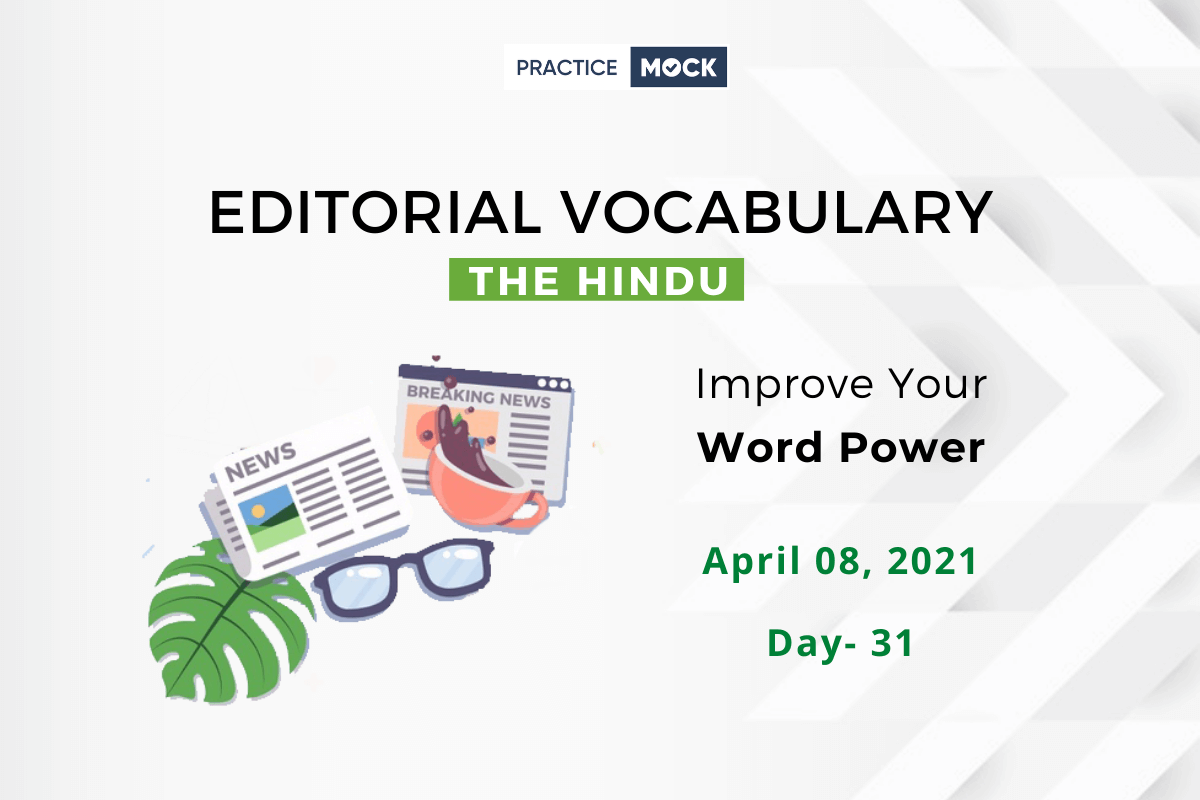Today we have collated the 10 tricky words/phrases from the editorial on RBI’s unchanged interest rates. Go through these words and see how many did you know already. Check their usage as well. This will surely help you to understand the sense the tricky words have conveyed in the editorial.
| Difficult Word/ Phrase | Contextual Meaning |
| Accommodative | intended to stimulate economic activity by lowering interest rates |
| Drop its guard | to stop being careful to avoid danger or difficulty |
| Upsurge | an increase |
| Dampen | make less strong or intense |
| Cloud | make or become less clear |
| Efficacy | the ability to produce a desired or intended result |
| Ramp up | increase the level of something sharply |
| Rebounding | recover in strength after a decrease or decline |
| Remit | an item referred to someone for consideration |
| Across the board | applying to all |
SBI Clerk 2021 Prelims Free Mock Test
Staying accommodative (intended to stimulate economic activity by lowering interest rates): on RBI keeping interest rates unchanged
The RBI cannot afford to drop its guard (to stop being careful to avoid danger or difficulty) on price stability while in search of growth
Armed with a renewed mandate to contain inflation within a 2 percentage point range of the target 4%, and mindful of the pandemic’s latest wave, the RBI’s monetary policy committee has opted to reaffirm its growth-supportive “accommodative stance” and keep interest rates unchanged. The MPC, which met for the first time in the new financial year, also maintained its projection for GDP expansion in the current fiscal at 10.5%, notwithstanding the risks to the forecast from the current upsurge (an increase) in novel coronavirus cases and associated localised lockdowns. Explaining the rationale for its policy stance of being prepared to stay accommodative for ‘as long as necessary’ to ensure that economic growth becomes ‘durable’, the committee was unambiguous that its actions were born of the need to stay supportive at a time when there was a real threat that “the renewed jump in COVID-19 infections… could dampen (make less strong or intense) the demand for contact-intensive services, restrain growth impulses and prolong the return to normalcy”. That consumer confidence has dipped, as the MPC noted, is a clear sign that uncertainty clouds (make or become less clear) the outlook for growth. Add to this the fact that IHS Markit’s Manufacturing Purchasing Managers’ Index (PMI) survey for March revealed that business sentiment had slid to a seven-month low, even as the research firm’s subsequent India Services PMI report showed both manufacturers and services companies continued to shed jobs for a thirteenth month. With jobs and incomes remaining under stress for millions, and uncertainty over the efficacy (the ability to produce a desired or intended result) and safety of the vaccines persisting even as authorities seek to ramp up (increase the level of something sharply) the immunisation drive, it is hard to foresee consumption demand rebounding (recover in strength after a decrease or decline) to pre-COVID levels any time soon.
SBI Clerk 2021 Prelims Free Mock Test
The MPC’s central remit (an item referred to someone for consideration) on inflation also remains a concern. Core inflation, the panel observed, had hardened across the board (applying to all) and increased by 50 basis points to touch 6% in February. The RBI is cognisant of the fact that there are both upside and downside pressures that may impact the trajectory of retail inflation. Governor Shaktikanta Das has flagged the critical significance that this year’s monsoon rains will have on food prices, which have been a recent source of upward pressure on price stability. And both Mr. Das and the broader committee have stressed the vital need for the Centre and States to initiate some coordinated action to ease the tax burden on petroleum products, given the ripple ‘second-round’ effects that the high costs of transport fuels have on overall inflation. High international commodity prices and logistics costs are also threatening to push up input costs across the manufacturing and services sectors, posing a real challenge to policymakers, given that it is far harder to influence these variables. With the RBI’s own March survey on inflation expectations showing that urban households expect prices to accelerate over a one-year horizon, monetary authorities can ill afford to drop their guard on price stability. For, at stake is their hard-earned credibility.
SBI Clerk 2021 Prelims Free Mock Test
Want to improve your vocabulary further? Download the Lists of Word-Meanings of Previous Months here.
- Sign Up on Practicemock for Updated Current Affairs, Free Topic Tests and Free Mini Mocks
- Sign Up Here to Download Free Study Material
Free Mock Tests for the Upcoming Exams
- IBPS PO Free Mock Test
- RBI Grade B Free Mock Test
- IBPS SO Free Mock Test
- NABARD Grade A Free Mock Test
- SSC CGL Free Mock Test
- IBPS Clerk Free Mock Test
- IBPS RRB PO Free Mock Test
- IBPS RRB Clerk Free Mock Test
- RRB NTPC Free Mock Test
- SSC MTS Free Mock Test
- SSC Strenographer Free Mock Test
- GATE Mechanical Free Mock Test
- GATE Civil Free Mock Test
- RRB ALP Free Mock Test
- SSC CPO Free Mock Test
- AFCAT Free Mock Test
- SEBI Grade A Free Mock Test
- IFSCA Grade A Free Mock Test
- RRB JE Free Mock Test
- Free Banking Live Test
- Free SSC Live Test



